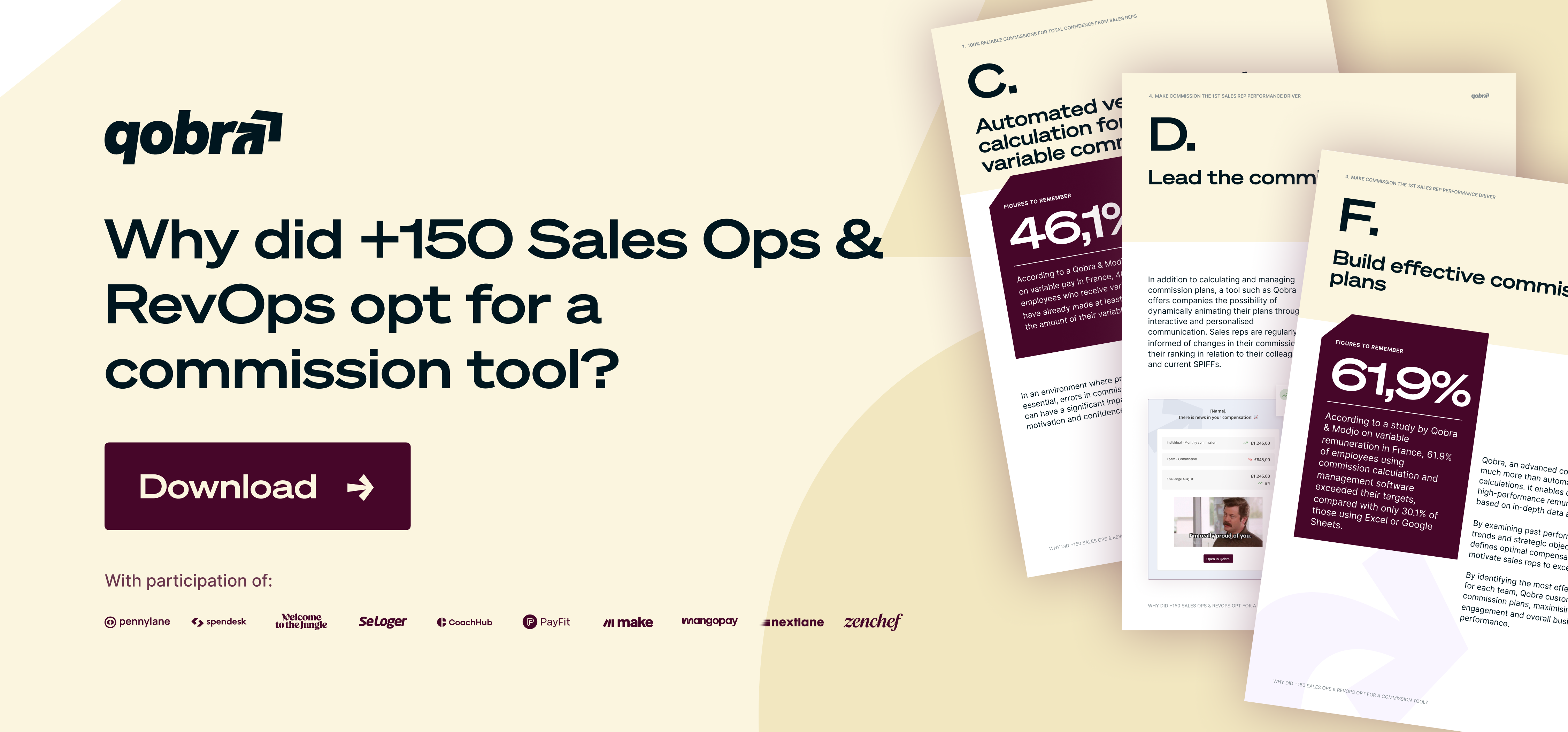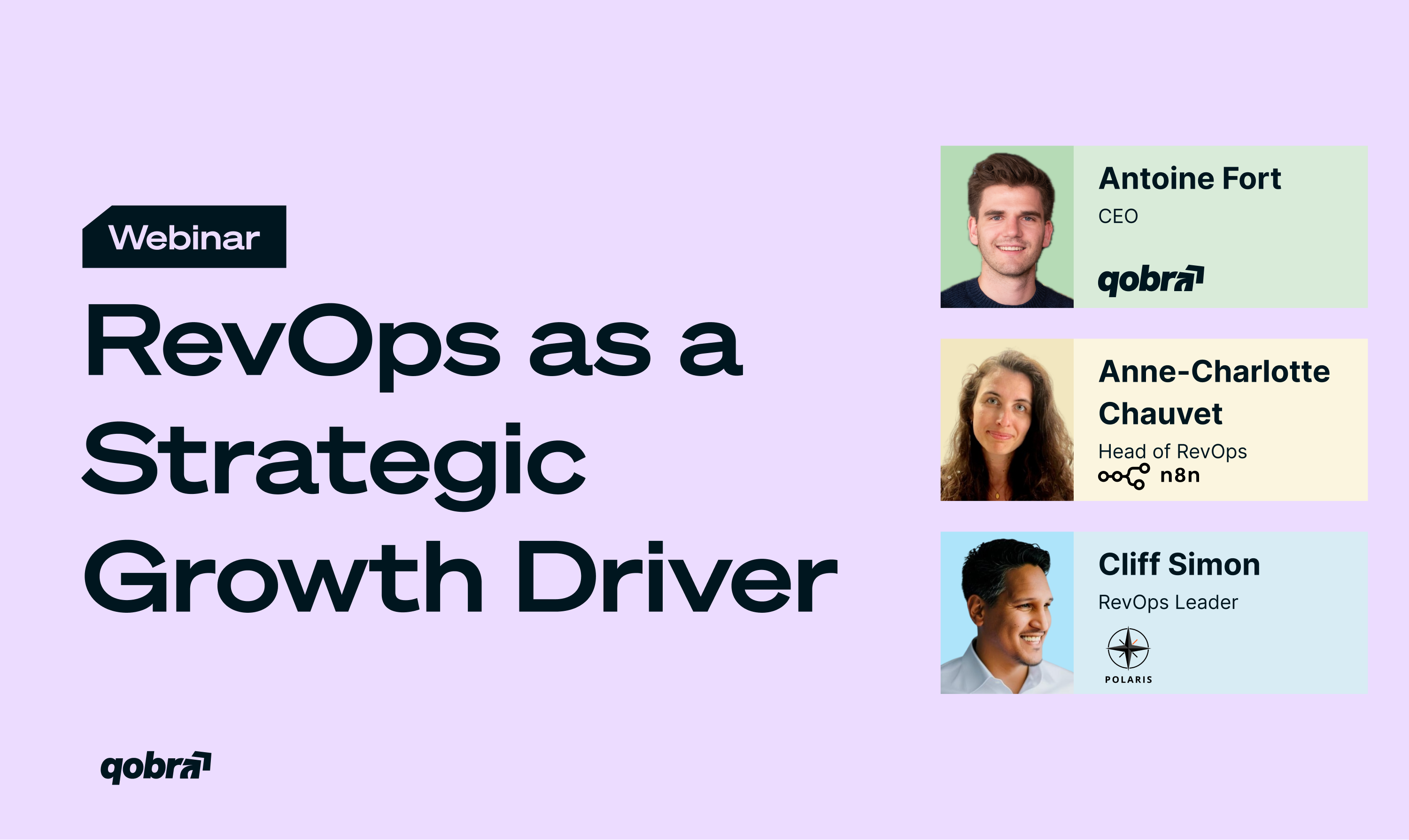Webinar (Tuesday, March 10): How ElevenLabs and n8n Run Commissions at Scale with Qobra
RegisterSales compensation can make or break your go-to-market strategy. When it works, it motivates sales teams, drives growth, and builds trust. When it doesn’t, it causes frustration, churn, and financial misalignment.
In this Qobra webinar recap, Cliff Simon (CEO at Polaris Ops), Sarah Nels (RevOps Leader), and Antoine Fort (CEO at Qobra) explain why so many compensation plans fail, and how to fix them with clarity and confidence.
1. What Is Sales Compensation, and Why It Matters
A sales compensation plan isn’t just about commissions or bonuses. It’s a strategic tool that aligns your revenue team with your company’s goals.
As Cliff Simon put it:
“The things you incentivize people to do are the things they’ll concentrate on.”
Cliff Simon, CEO at Polaris Ops
That’s why sales compensation should never be an afterthought. Sarah Nels added that transparency is key to attracting and retaining top talent:
“A well-structured and transparent compensation plan is a selling point during hiring. It shows you’re serious about rewarding performance.”
Sarah Nels, RevOps Leader
A clear plan doesn’t just pay your reps, it tells them exactly what success looks like.
2. The Most Common Reasons Sales Compensation Fails
Even well-intentioned companies fall into familiar traps. Here are the biggest mistakes to avoid:
a. Lack of trust in the system
Reps don’t trust spreadsheets or outdated tools. Manual calculations, delayed updates, and missing data lead to confusion, and resentment.
b. Misalignment with business goals
When commission structures don’t reflect real financial metrics like CAC (Customer Acquisition Cost) or LTV (Lifetime Value), reps can close deals that look good short-term but hurt margins long-term.
c. Lopsided performance
If only a few top reps hit their numbers, morale drops. Sustainable success requires balance across the team.
d. Forecasting inaccuracies
Poor visibility leads to inaccurate forecasts, missed targets, and a lack of accountability across teams.
3. How to Build a Sales Compensation Plan That Works
The panel shared a clear framework to design compensation plans that are fair, scalable, and effective.
a. Align with business objectives
Tie compensation directly to strategic goals and profitability. Ensure reps are rewarded for the right behaviors, not just activity.
b. Keep it simple and transparent
Salespeople should always understand how their pay is calculated, no hidden rules, no surprises. This builds trust and reduces “shadow trackers.”
c. Reward collective success
Encourage consistency across the team instead of just a few high performers. A balanced plan fosters collaboration and reduces churn.
d. Stay flexible
Use spiffs or short-term bonuses to experiment with new incentives, like rewarding accuracy in forecasting or closing specific customer segments, without rebuilding the entire plan.
e. Review and adjust regularly
Sarah Nels recommends quarterly and annual reviews with clear documentation and signatures from all parties. Compensation should evolve with your company, not against it.
4. Smart Compensation Strategies for Real-World Challenges
Every sales environment is different. Here’s how to tailor your plan for common situations:
- Launching new territories: Offer guaranteed commissions or early spiffs to build early momentum.
- Improving forecasting: Incentivize reps for accurate predictions, not just bookings.
- Boosting consistency: Introduce linearity bonuses to smooth out quarterly performance.
- Reducing churn: Link payouts to retention milestones to minimize clawbacks and protect margins.
When plans adapt to real-world dynamics, performance follows.
5. Ditch the Spreadsheets: Why Tech Matters
Many companies still calculate commissions using Excel or Salesforce dashboards. It’s a costly mistake.
As Sarah Nels explained:
“It’s never real-time. Reps end up building their own trackers. Errors pile up, and confidence drops.”
Sarah Nels, RevOps Leader
Modern tools like Qobra change that. They centralize data, automate calculations, and give everyone, from reps to finance, real-time visibility into performance.
That transparency builds trust, saves hours of manual work, and lets RevOps focus on strategy, not spreadsheets.
6. Final Takeaway: Compensation Is Communication
A sales compensation plan is more than numbers, it’s a message. It tells your team what matters and how they win.
When it’s fair, simple, and transparent, it builds momentum. When it’s broken, it breaks everything.
As Antoine Fort, Qobra’s CEO, summed up:
“Sales compensation is broken in most companies, but it doesn’t have to be. When you rebuild it around trust, alignment, and visibility, everything else falls into place.”
Antoine Fort, CEO at Qobra







